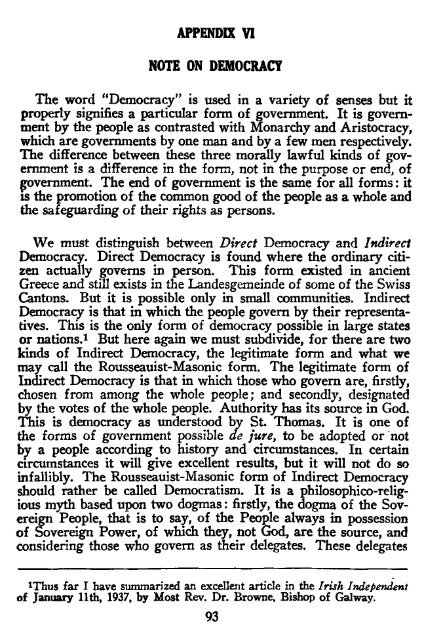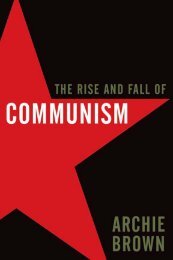B_345_The-Rulers-of-Russia
B_345_The-Rulers-of-Russia
B_345_The-Rulers-of-Russia
Create successful ePaper yourself
Turn your PDF publications into a flip-book with our unique Google optimized e-Paper software.
APPENDIX VI<br />
NOTE ON DEMOCRACY<br />
<strong>The</strong> word "Democracy" is used in a variety <strong>of</strong> senses but it<br />
properly signifies a particular form <strong>of</strong> government. It is government<br />
by the people as contrasted with Monarchy and Aristocracy,<br />
which are governments by one man and by a few men respectively.<br />
<strong>The</strong> difference between these three morally lawful kinds <strong>of</strong> government<br />
is a difference in the form, not in the purpose or end, <strong>of</strong><br />
government. <strong>The</strong> end <strong>of</strong> government is the same for all forms: it<br />
is the promotion <strong>of</strong> the common good <strong>of</strong> the people as a whole and<br />
the safeguarding <strong>of</strong> their rights as persons.<br />
We must distinguish between Direct Democracy and Indirect<br />
Democracy. Direct Democracy is found where the ordinary citizen<br />
actually governs in person. This form existed in ancient<br />
Greece and still exists in the Landesgemeinde <strong>of</strong> some <strong>of</strong> the Swiss<br />
Cantons. But it is possible only in small communities. Indirect<br />
Democracy is that in which the people govern by their representatives.<br />
This is the only form <strong>of</strong> democracy possible in large states<br />
or nations. 1<br />
But here again we must subdivide, for there are two<br />
kinds <strong>of</strong> Indirect Democracy, the legitimate form and what we<br />
may call the Rousseauist-Masonic form. <strong>The</strong> legitimate form <strong>of</strong><br />
Indirect Democracy is that in which those who govern are, firstly,<br />
chosen from among the whole people; and secondly, designated<br />
by the votes <strong>of</strong> the whole people. Authority has its source in God.<br />
This is democracy as understood by St. Thomas. It is one <strong>of</strong><br />
the forms <strong>of</strong> government possible de jure, to be adopted or not<br />
by a people according to history and circumstances. In certain<br />
circumstances it will give excellent results, but it will not do so<br />
infallibly. <strong>The</strong> Rousseauist-Masonic form <strong>of</strong> Indirect Democracy<br />
should rather be called Democratism. It is a philosophico-religious<br />
myth based upon two dogmas: firstly, the dogma <strong>of</strong> the Sovereign<br />
People, that is to say, <strong>of</strong> the People always in possession<br />
<strong>of</strong> Sovereign Power, <strong>of</strong> which they, not God, are the source, and<br />
considering those who govern as their delegates. <strong>The</strong>se delegates<br />
1<br />
Thus far I have summarized an excellent article in the Irish Independent<br />
<strong>of</strong> January 11th, 1937, by Most Rev. Dr. Browne, Bishop <strong>of</strong> Galway.<br />
93





